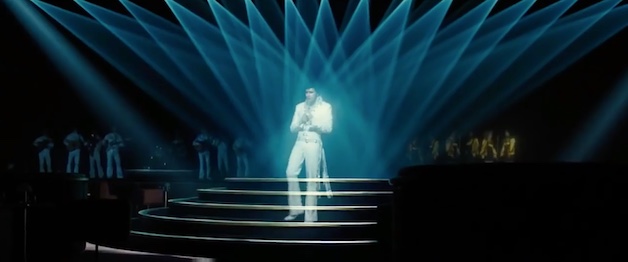. . . . Our best recent thing was el V's birthday party on Sunday. We invited friends to attend the IFC theater for the new documentary, "The King."
The premise is that the rise and decline of Elvis mirrors the decline of the USA -- and that it is fame that ultimately destroys everything. It is driven through US geography and history via Elvis's Rolls Royce.
My interest then was piqued, because I had been thinking quite a bit about the only elements of the 2017 Blade Runner sequel, Blade Runner 2049 that seemed to have any actual significance --
of Las Vegas and the Elvis hologram that had remained in the ruins. That is all that seems to have survived from the world and the nation that I had known . . . .
So, one can see that The King has aspects of interest -- and controversy -- for many of us. Our group in particular had many a way of viewing this film, as among us were documentary film makers, historians, musicians and composers, fashion and costume designers, etc. One of the discussions within The King is cultural appropriation -- did he steal it all from black people and never given them proper due? (Many / most?) black people, as some of us who live up in Harlem made clear, have no doubt Elvis stole. David Simon's white man's opinion is different. So the common conversation at dinner was more than lively.
The King's thesis is not necessarily wholly successful throughout but the eyes are always compelled by what is on the screen.
First, the young Elvis Presley was simply one of the most beautiful people that ever lived. Plus he had that charisma, that star power, that always drew all eyes to him, in person and on the screen and in photos.
One of his few rivals for beauty, star power and charisma in the times during which he lived was Muhammad Ali, whom we do see and hear too during the course of the film. Muhammad Ali is the anti-Elvis, the one who spoke out against racism and the war in Vietnam, the one who didn't always choose the money, the one who went to jail rather than kill brown people across the world from where he lived. Elvis joined the army and got addicted to pills and very young girls. And always chose the money.
There's historical video and film footage. Along with this there is extensive talking head footage in the Rolls that carried at different times hitch hikers, various writers like our friend Greil Marcus, actors, musicians and others such as David Simon opining on the meaning of the life of Elvis, fame and the wreck that is the USA, the then upcoming 2016 presidential election, and how in the world have we come to this? (Alec Baldwin, from inside the Rolls, informs us that the orange nazi shall never win.)
Sunday's weather cooperated. It was a beautiful summer day. When we exited IFC theater, the early evening was like, well, maybe sitting on a patio in Provence, looking toward the western ranges while the sun sets in super-saturated sherbet colors, and we dissolved into as one does in company at that limnal time of day, in company of dear friends and drinking (a good) rosé. The early evening continued more lovely as we tripped along the sidewalks of downtown Manhattan. When we left the first restaurant for dessert and coffee at another one, it was even more lovely. When we parted company the temperature had gotten cool enough for light jackets. Such a pleasure after the long string of brutal heat and humidity all day and all night.
Later, before falling into sleep I continued to think of the USA and whether it was really different from its European mother countries. Italy gave us "sprezzatura," originating in Baldassare Castiglione's The Book of the Courtier, where it is defined by the author as "a certain nonchalance, so as to conceal all art and make whatever one does or says appear to be without effort and almost without any thought about it." From France, we received "panache" the connotation of flamboyant manner, bravery and courage, even unto recklessness, as in Cyrano de Bergerac and The Three Musketeers. Additionally France has given us through the ballet the concept of "ballon," the appearance of being lightweight and light-footed ,as though a dancer effortlessly becomes airborne, floats in the air, and lands softly. The Brits gave us "swashbuckling" Robin Hood and the Scarlet Pimpernel.
What idea of effortless flair has the USA contributed to the world, that everyone strives to project of themselves? "Cool," of course, the concept of cool. Even though he wasn't black, Elvis possessed cool in spades. (Let us not forget though, that 'cool' was a concept that came to the USA from Africa, as brilliant Robert Farris Thompson has so well documented here and elsewhere.)
Subscribe to:
Post Comments (Atom)





No comments:
Post a Comment